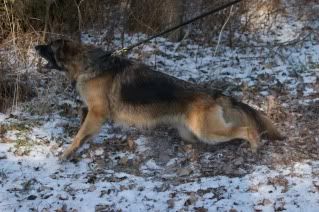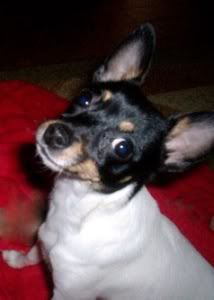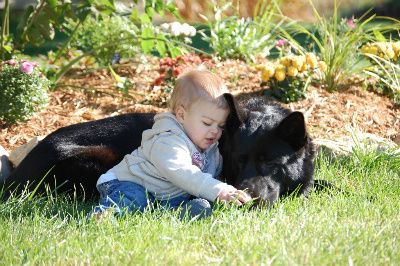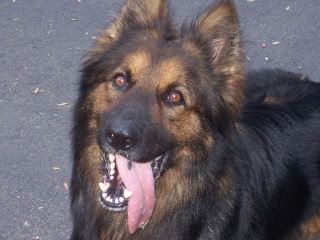 Re: What is dominant?
[Re: steve strom ]
#257273 - 11/20/2009 02:29 PM Re: What is dominant?
[Re: steve strom ]
#257273 - 11/20/2009 02:29 PM |
Moderator
   
Reg: 06-14-2002
Posts: 7417
Loc: St. Louis Mo
 Offline Offline |
|
I'm not real big on terminology or wolf studies & pack stuff but I don't believe an actual dominant dog has those types of issues.
The only dogs I have had pointed out to me or shown to me by people who know always seem calm and confident to me. A certain aloof indifference. Of course they are owned by people who have no problem with that type of dog. There does seem to be an amount of showing the dog they have to do something when training them, not just having him want to.
I'll agree with Steve on this one. I will add that a dominant dog doesn't mean an aggressive dog. This is where the "calm and confident" comes into play.
A lack of leadership will create a dog that shows dominant behaviours but in reality the "dominant" dog that many people believe they have is nothing more then a spoiled pia!
My 2 1/2 yr old GSD is a wild, pushy, in your face kinda dog.
My almost 6 yr old GSD is calm, laid back dog that has no issues with anyone or anything...as long as they respect him.
They are both intact, male, working line GSDs and are kenneled together.
No matter how much the younger one can be a pia with pestering the older one I can not forsee a problem with the two of them being together. The younger one needs nothing more then a look from the older one to mind his manners.
old dogs LOVE to learn new tricks |
 Top Top
|
 Re: What is dominant?
[Re: Kristel Smart ]
#257274 - 11/20/2009 02:31 PM Re: What is dominant?
[Re: Kristel Smart ]
#257274 - 11/20/2009 02:31 PM |
Webboard User
  
Reg: 10-06-2005
Posts: 2686
Loc: llinois
 Offline Offline |
|
I think there are many dogs who occasionally engage in dominant BEHAVIOR, but are not dominant dogs at their core. Just as humans have many aspects to their personality, one trait or behavior does not sum them up wholly, IMHO.
Naturally, there are also varying degrees of dominance. If I say a dog is dominant, I try to always qualify it by saying HOW the dog is dominant...does it act dominant only w/a weak handler, other dogs, etc. etc. I think there are very very few truly dominant dogs. And honestly, true dominance is really quite a PITA.
|
 Top Top
|
 Re: What is dominant?
[Re: Jenni Williams ]
#257277 - 11/20/2009 02:39 PM Re: What is dominant?
[Re: Jenni Williams ]
#257277 - 11/20/2009 02:39 PM |
Webboard User
  
Reg: 08-16-2007
Posts: 2365
Loc: Toronto, Ontario, Canada
 Offline Offline |
|
I think what I was thinking (what a sentence) is similar to Jenni - when dominance comes up, I tend to think of rankiness/rank drive.
Some dogs are more focused on rank than others, and are more pushy about it than others. There is a continuumn of behaviours, and I'd agree that very few dogs are actually dominant.
I would class Teagan as ranky, but she's not dominant. She is the dominant DOG in the house, but she is submissive to me (now, I had to learn to handle her) and she is generally pretty respectful of Toby though there's some things to iron out now that he's here full-time (things that greatly amuse me, b/c I'm mean, but are an annoyance to him).
Teagan!
 |
 Top Top
|
 Re: What is dominant?
[Re: Jennifer Mullen ]
#257362 - 11/20/2009 11:47 PM Re: What is dominant?
[Re: Jennifer Mullen ]
#257362 - 11/20/2009 11:47 PM |
Webboard User
  
Reg: 09-24-2009
Posts: 220
Loc: Arizona, Cochise County, USA
 Offline Offline |
|
I am experience with wolves. Have been a consultant to zoos with wolf behavior issues. And have trained and done behavioral rehab on wolves and wolfdogs. As well as my dog training experience beginning in the 60s with police dog training. I am currently a guide dog trainer, and have been off and on since '69
Dominant over who?
I will assume by dominant, you mean alpha; although that term has come into disfavor now-a-days. I know no other term that conveys the status role better.
An alpha dog, as others have stated using the more flexible and therefor more confusing term of dominance; is confident and calm. They have no need to prove themselves so are not quarrelsome. An alpha would NOT display SA, as they have no need to be in your presence for either protection or affirmation. An alpha will protect his pack, but will only do so if he percieves real danger and not look for trouble. Dogs have been selected for a long time for their complience to man. This is probably why true alpha dogs are so rare. An alpha needs no posturing. An alpha does not initiate greeting, but is greeted by the lower ranks. This is one of the things many people do with their dogs that give the wrong message. Coming home and greeting their dog happily saying "I missed you." is perceived by canines as an action of a subordinate. An alpha who returns from an absence is greeted by the other pack members, while he continues moving straight to where he is heading. Everyone moves aside yet begs for his favor. He merely accepts it as his due.
Many people confuse a quarrelsome, pushy beta with an alpha. A dog that postures when meeting another, growls easily, and is prone to fighting if the other dog does not submit; is a beta. A beta will be quick to try to take over a pack. If the alpha abrogates his place, becomes weak in personality presence, or if there is no alpha; a beta will quickly step into the dominant role. You'll note I said dominant, not alpha. A beta will not become an alpha except in very rare instances, if at all. Betas talk a good bluff, but are at heart insecure.
A gamma is the soft, yet not shy or fearful dog. Gammas will readily submit to alphas or betas, but don't seem to take the matter very seriously. They rarely demand submission from lower ranking pack members. If there are multiple gammas, as packs with more than 4 dogs will likely have, the gammas will often change ranking positions with each other easily. One submitting to another sometimes, and reversing their rank at others. For the average person, a gamma is the best choice.
The lowest rank is the omega. Omegas tend to be fearful and shy. Omegas and betas are most likely to be biters, outside of dogs trained for bite-work which is a whole other meaning of biting dog.
Stable packs see very little conflict. This leads to many assuming pack dominance is not common. Any rank will accept a dominant role if there is an alpha vacuum. The stress of being in a dominant role for a dog who is not by nature an alpha is great. Almost all dogs are happier with someone else accepting the responsibility of being the alpha, except for the rare true alpha dogs.
|
 Top Top
|
 Re: What is dominant?
[Re: Jenni Williams ]
#257367 - 11/21/2009 02:13 AM Re: What is dominant?
[Re: Jenni Williams ]
#257367 - 11/21/2009 02:13 AM |
Webboard User


Reg: 08-16-2005
Posts: 1221
Loc:
 Offline Offline |
|
I think there are many dogs who occasionally engage in dominant BEHAVIOR, but are not dominant dogs at their core. Just as humans have many aspects to their personality, one trait or behavior does not sum them up wholly, IMHO.
Naturally, there are also varying degrees of dominance. If I say a dog is dominant, I try to always qualify it by saying HOW the dog is dominant...does it act dominant only w/a weak handler, other dogs, etc. etc. I think there are very very few truly dominant dogs. And honestly, true dominance is really quite a PITA.
Having, as I already mentioned, owned a truly dominant dog, I totally agree with the statement that it is really quite a PITA and I would not wish to own another precisely like him.
"A dog wags his tail with his heart." Max Buxbaum

|
 Top Top
|
 Re: What is dominant?
[Re: Elaine Haynes ]
#257370 - 11/21/2009 07:21 AM Re: What is dominant?
[Re: Elaine Haynes ]
#257370 - 11/21/2009 07:21 AM |
Webboard User
  
Reg: 06-30-2005
Posts: 974
Loc: northeast
 Offline Offline |
|
I've never had one and i've never met one either.
|
 Top Top
|
 Re: What is dominant?
[Re: Al Curbow ]
#257371 - 11/21/2009 07:38 AM Re: What is dominant?
[Re: Al Curbow ]
#257371 - 11/21/2009 07:38 AM |
Webboard User
  
Reg: 10-06-2005
Posts: 2686
Loc: llinois
 Offline Offline |
|
Joy's wolf post is interesting, and kind of why I said I like to clarify HOW a dog is behaving dominantly, b/c, as she states, there are the "quarrelsome betas" and there are true alphas...but rarely.
If I applied that to my own house, it's clear as day who is alpha and who is beta, and so on. I have one dog who I would call an alpha b/c he truly just coexists peacefully with me, and if I'm honest, he thinks I belong to him. I think he does have some respect for me, but it's not nearly as noble as it appears to outsiders. We get along great now that we have reached an understanding, but if I try to get too pushy with him, I get nowhere. All the other dogs greet him submissively and shyly, and he all but ignores them. Same with people. If you are not a threat, he couldn't care less. However, if an outsider threatens any of my other dogs,he is ready to take them on. He is only difficult in his aloofness and general indifference. A trainer summed it up nicely "he could give a $hi+ less." In all the years I've had him, I cannot remember him EVER starting a fight. He's the dog that the other dogs crawl on their bellies around although he has never acted harshly toward them.
I also had the pushy beta who is the one that most people would call dominant. He was CONSTANTLY trying to overthrow the alpha every chance he got. He would have to resort to cheap shots, like when the other dog was going to the bathroom, he would attack. He would quickly relent when that didn't go over very well and try again the next day. He was quite friendly, outgoing, confident in any environment, but a real jerk aroundn other animals. Went out of his way to pick fights and just generally talked a lot of $hi+.
Interesting topic, if you think about the terms as they truly mean, and not what we casually throw them around as meaning.
|
 Top Top
|
 Re: What is dominant?
[Re: Joy van Veen ]
#257436 - 11/22/2009 01:20 AM Re: What is dominant?
[Re: Joy van Veen ]
#257436 - 11/22/2009 01:20 AM |
Webboard User
   
Reg: 07-10-2006
Posts: 4454
Loc: Arkansas
 Offline Offline |
|
|
 Top Top
|
 Re: What is dominant?
[Re: Michael_Wise ]
#257470 - 11/22/2009 08:06 PM Re: What is dominant?
[Re: Michael_Wise ]
#257470 - 11/22/2009 08:06 PM |
Webboard User

  
Reg: 09-22-2007
Posts: 2531
Loc: S. Florida
 Offline Offline |
|
Great post, Joy. It sounds like you have led a very interesting life,btw...
Jenni, thanks for giving those examples; it really clarified what Joy was saying.
|
 Top Top
|
 Re: What is dominant?
[Re: Michael_Wise ]
#257477 - 11/22/2009 09:02 PM Re: What is dominant?
[Re: Michael_Wise ]
#257477 - 11/22/2009 09:02 PM |
Webboard User
Reg: 06-28-2009
Posts: 294
Loc: Indiana
 Offline Offline |
|
I used to think my pittyx was dominant until I bought the video here. Now I know there are different levels and types. My third dog and last rescue has dominant issues, but they are not severe. Being the third dog shook up the structure a bit. When I got him he was dragging the rescue lady all over the store.He also would bite instead of lick but not break the skin. I was certain he was dominant. But a prong and constant walking, add biking and he's become a much better dog. He has some of the dominant traits but they are slowly being eliminated. He even gives kisses gently now, but sometimes bumps the chin with his open mouth. We just say "no bite" and he kisses nicely maybe one or two. Since he pulled and didn't know what to do or how to act I associated that with dominance. Now I know he's not really a dominant dog. I guess now I associate a dominant dog with one who's gotten that way because it's been allowed to for so long without corrections. I'm not sure about the whole "dominant" label though because the video mentioned being able to see dominance in puppies.
 |
 Top Top
|
When purchasing any product from Leerburg Enterprises, Inc. it is understood
that any and all products sold by Leerburg Enterprises, Inc. are sold in Dunn
County Wisconsin, USA. Any and all legal action taken against Leerburg Enterprises,
Inc. concerning the purchase or use of these products must take place in Dunn
County, Wisconsin. If customers do not agree with this policy they should not
purchase Leerburg Ent. Inc. products.
Dog Training is never without risk of injury. Do not use any of the products
sold by Leerburg Enterprises, Inc. without consulting a local professional.
The training methods shown in the Leerburg Ent. Inc. DVD’s are meant
to be used with a local instructor or trainer. Leerburg Enterprises, Inc. cannot
be held responsible for accidents or injuries to humans and/or animals.
Copyright 2010 Leerburg® Enterprises, Inc. All rights reserved. All photos and content on leerburg.com are part of a registered copyright owned by Leerburg Enterprise, Inc.
By accessing any information within Leerburg.com, you agree to abide by the
Leerburg.com Privacy Policy and Terms of Use.
 Previous Topic
Previous Topic Index
Index Next Topic
Next Topic












 Top
Top






.jpg)

